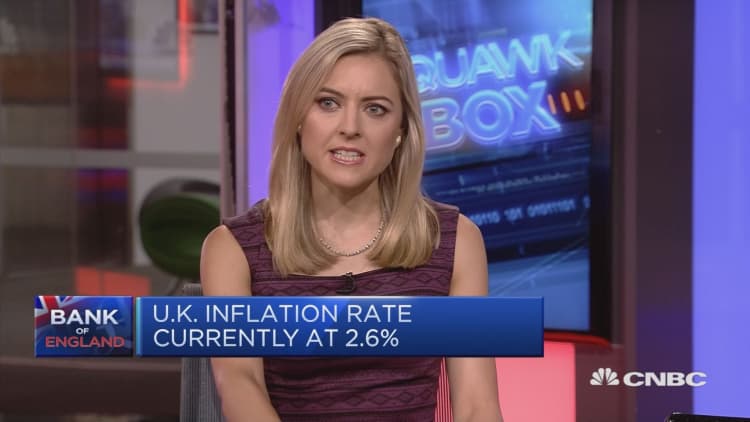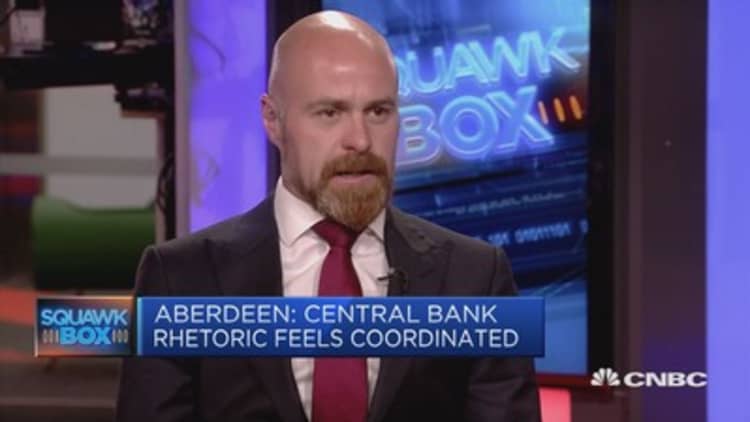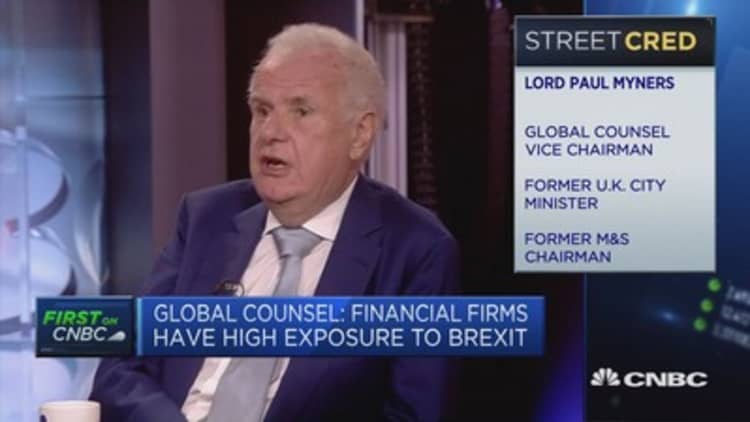
Summer data appear to have given doves a boost ahead of Thursday's Bank of England (BOE) rate decision, with just 2.5 percent of analysts polled by Reuters expecting a rate rise.
Investors seem to be nodding in agreement with market indicators pointing to a mere 8 percent chance of a 25 basis point tightening this week. Yet at the beginning of the summer, divisions at the bank's MPC's (Monetary Policy Committee) were sharply exposed with a surprise 5-3 vote split on whether to raise interest rates.
The hawkish minority saw inflation - measured by the consumer price index (CPI) - consistently above the BOE's target of 2 percent while unemployment reached 40-year lows.
Meanwhile, doves - who believe in easy monetary policy and are more concerned on jobs - preached that inflation has peaked, and warned on sluggish growth rates amid a backdrop of volatile Brexit fueled politics.
While these fault lines remain, heading into the meeting the second-quarter data increasingly support the latter argument and Governor Mark Carney's Brexit-fueled concerns.
Inflation has been central to Threadneedle Street's recent focus. Contrary to most of the developed world it has been high, reaching 2.9 percent in May. In this context June's CPI reading was significant coming in at 2.6 percent emboldening those who have argued peak inflation has been reached.
In addition, as Morgan Stanley analysts pointed out last week, even this is not the result of a booming economy and rising service prices but rather goods inflation, susceptible to one-off external factors like the politically-induced weaker pound. Governor Carney is known to be looking for more domestically generated inflation before fully buying into what look like robust CPI numbers.

Personnel shuffling at the top has further strengthened the dove's hand. Of the June hawks policy maker Kristin Forbes has been replaced by Silvana Tenreyro, someone more likely to side with Carney's stance leaving Ian McCafferty and Michael Saunders as the lone hike proponents.
GDP (gross domestic product) growth has also failed to excite with a weak first-quarter rise of 0.2 percent (quarter-on-quarter) - falling well short of a BOE expected 0.5 percent, This was compounded by second-quarter growth of just 0.3 percent making the BOE's 2017 target of 1.9 percent growth look optimistic at best.
Beneath these headline figures lie a worrying pattern of growing consumer fragility of the kind many expected shortly after the Brexit vote yet has only emerged more recently. As Deutsche Bank highlighted in a recent note, stagnant real wages (exacerbated by structural productivity problems), have combined with rapid CPI carry-through to create a real wage squeeze and shrinking disposable income.
The broader economic effect has been swift: Retail sales have been flat in the first half of the year while manufacturing and services figures have slipped in the second quarter and corporate lending for capital expenditure has fallen to its lowest level since 2011. As Nomura has highlighted, this real wage weakness combined with high employment levels has led to a consumer debt binge to fund even this reduced level of spending; annual consumer credit has grown at a rate above 10 percent for the past year as borrowing against future income becomes increasingly tempting. That figure means unsecured consumer credit topped £200 billion ($265 billion) in July for the first time since 2008, triggering a Moody's warning and a regulator review on lending practices.

The bind for the BOE lies in how to react - a rate rise should dampen inflation pressure yet raise too soon and the effect on business of weak consumer spending is compounded while borrowers struggle to service household debt that is rapidly reaching unsustainable levels.
This macroeconomic picture has implications for that page turner known as the "Quarterly Inflation Report", also released by the bank on Thursday. Growth forecasts for 2017 are expected to come down slightly, while exceedingly strong employment numbers should prompt a re-think on unemployment rates in the medium term. Given the MPC's consistent view that balance sheet normalization will only begin once rates have risen significantly, analysts expect gilt (U.K. sovereign bond) stocks to remain unchanged and corporate bond purchases consistent at the £10 billion mark.
While hawks may be vanquished on Thursday, the tone the bank sets is likely to appease them. Longer term, few in the City of London believe a rate rise can be resisted heading into 2018. An output gap that continues to shrink, headline CPI above trend and unemployment consistently low heralds higher rates in the medium term - with or without consumers aboard.

